New life
A broody hen, a visit from a friend, house cleaning, amateur plumbing, more hiking, and the tilling saga continues.
In the last post I kept something from you. It’s this: when I first arrived, Ioannis informed me that there was a broody hen sitting on 12 eggs in a basket in one of the storage rooms underneath the house. He had marked the date in the calendar when they would hatch: April 8. One of the many things I’ve learned about chicken reproduction over the past few weeks is that chicks hatch exactly 21 days after the hen starts sitting on them. And these broody hens are pretty insane: they just sit on their eggs (in this case Ioannis mixed in some of Maria and Giannis’s recent eggs, just to keep the gene pool heterogeneous) for three weeks straight, and barely get up. I regularly went to check on the hen to make sure she still had clean water and corn. The corn I gave her at the start was still the same corn she had 3 weeks later. There was no evidence the water had been touched. And a few times I was certain she was dead. But every time I got too close, I heard faint sounds of indignation. So, following the converging advice of Ioannis and the internet, I let her be.

In the meantime, the highlight of week 2 was my friend Judith’s visit. We spent countless hours on various projects, most of which involved visiting various stores across the island. The biggest change of the week was undoubtedly the cleaning of the house, which required multiple days of multiple committed people putting in full workdays. Judith and I’s task was to organize the cleaning supplies. Sounds simple, but meant many trips to many different stores. The recommended store for buying a vacuum cleaner — a skoupa/σκούπα, great word! — was closed for renovations. The alternative was a half hour farther away, on the way to Mesaria. We got the wrong metal scrubbers. We needed four liters of vinegar and a bunch of soda. And so on. We drove loads upon loads of trash and recycling to the big bins on the way to town. At the end, we all let out a sigh of relief.
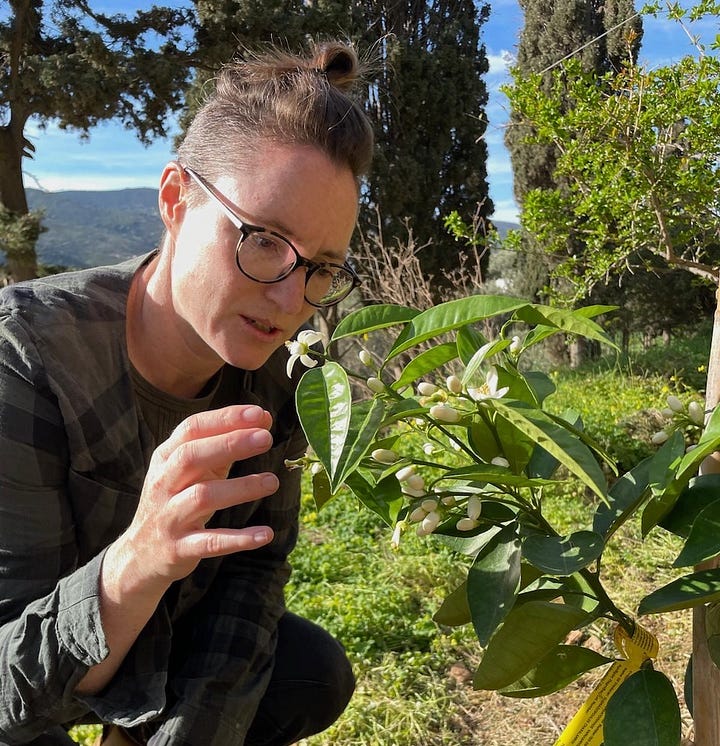
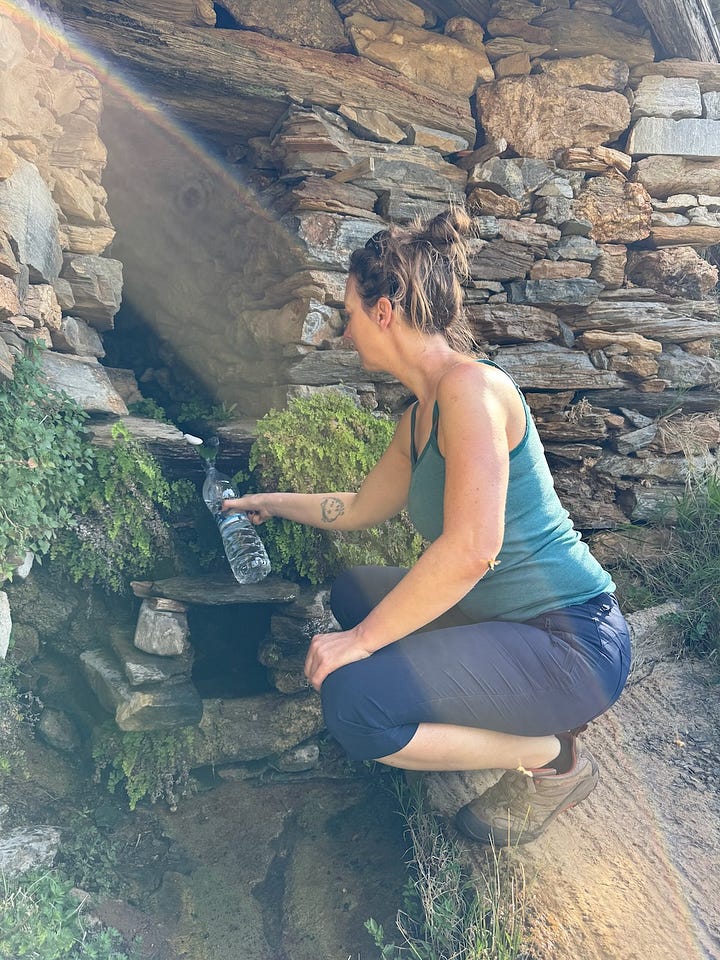
Between our various cleaning outings, we had great ambitions to complete a few other projects. Fix a leaking valve on a hose outdoors. Install the weather station that Judith brought from Germany. Build a composting system. Just the first of these turned out to be a multi-day project. The offending valve was attached to one of the thick pipes that came down from somewhere on Terrace 1 and had a hose connected on the other side to water the Terrace 2 patio plants. Taking the valve off would mean water would uncontrollably rush out, so we had to figure out where the water was coming from and where the next higher up valve was that we could turn off while we fixed the valve. Thus began our odyssey through the vast unpruned shrubbery of Terraces 1 and 2. “Προσέξτε τα φίδια,” “Be careful with the snakes,” all the locals keep telling me. They like to hang out in unkempt grass and between rocks.

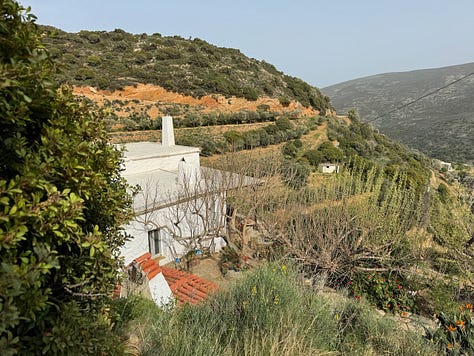
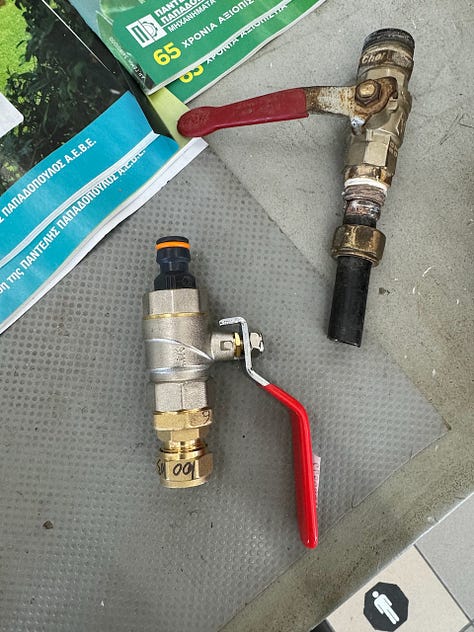
After a few hours of tracing pipes and luckily not encountering any snakes, we understood we’d have to turn off the main municipal water line into the property. We drove to the hardware store, got a new valve and the pieces and tape surrounding it. Stopped at the grocery store. Stopped at the post office to see if the box with the mail had anything with my name on it. (No.) Stopped at the other hardware store to get more cleaning supplies. Eventually got back, turned off the community water line, and cut the valve off the pipe. Ioannis called and as I used part of my attentional resources to talk to him, the remainder watched with a sinking feeling as it became clear that Judith’s best attempts to fit the valve onto the pipe would be futile because we had gotten the wrong size valve. I ended the call and we sat for a second in the realization that, having cut off the end of the pipe, we couldn’t turn the main water line on again and the hardware store was closed and so we’d have to make it through the remainder of the day without water.






Until of course I remembered that Ioannis had many redundant water systems set up, presumably not exactly for this case, but for the general case of the municipal water being out of commission. Complementing our new understanding of the way all the pipes on the property were connected, I found the videos Quinn and I had made in the winter, explaining which valves to turn how to switch to one of the backup systems. A few turns of various valves later, and we were with weakly pressurized water, but water nevertheless. The next day, we drove back to town. Dropped off some trash on the way. Had a coffee. Went to the Jumbo store to get some more kitchen items. Dropped of some blankets at the dry-cleaner. And found the correct valve piece at the hardware store. We also implemented a new rule: no more than four stops on any journey to town. Back at home, the new piece fit like a glove. We generously wrapped plumber’s tape around the threaded parts of the valve, closed the valve, turned on the main water line, and there it was: nothing. No leak. Success! (But of course we never got to the weather station or the composting system.)
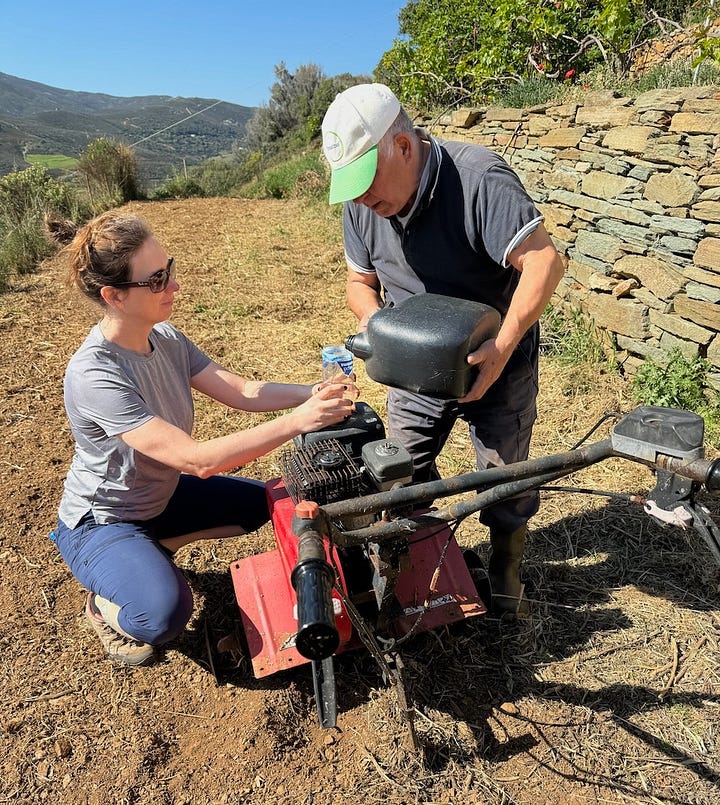

Another success of the week: Ioannis dropped by to finish tilling Terrace 4. Why, given that he had shown me how to use the tiller? Because I apparently didn’t spend enough time on each spot to go deep enough. We fashioned a makeshift funnel out of a cut off water bottle, refueled, and off he went. After an hour, the whole field was ready to receive plants. Or so I thought: A few days later, on a windy morning, irrigation expert and neighbor from across the valley Stavros and his wife came to start installing the new dripline system for the terrace. We (they) installed a new filter on the Terrace 1 water tank, ran a new pipe down to Terrace 4, and put in the main line. After successfully fixing a leak, we had water on Terrace 4! But it turned out: not even Ioannis had tilled quite deep enough for Stavros’s liking. He would return soon with his bigger machine to till it to half a meter deep. But there was about to be rain, and more wind, and generally conditions that would be adverse to tilling and planting. As the South winds howled around us, I was grateful for the projected welcome gift, but started wondering whether the vegetables would ever go into the ground.
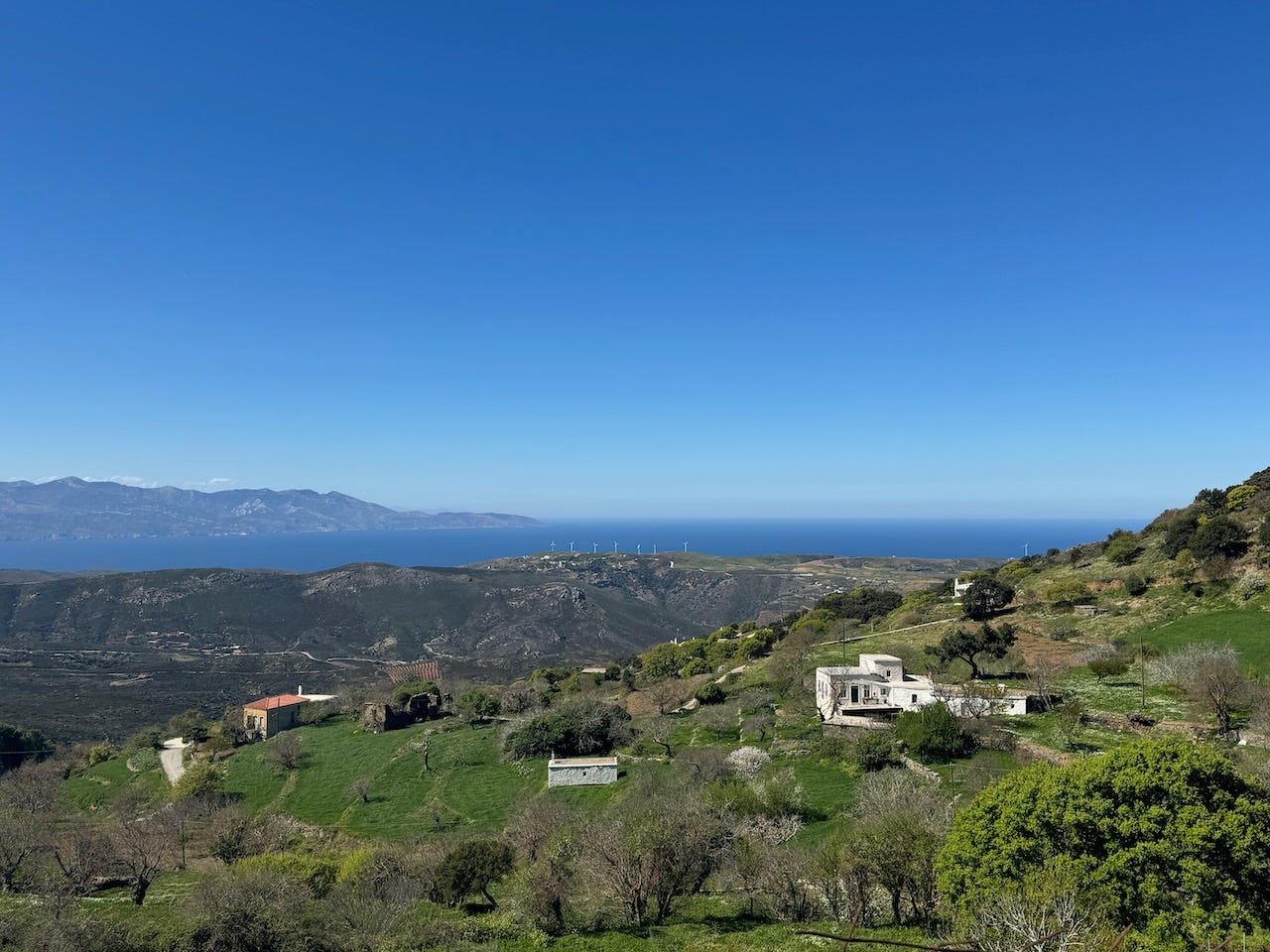
After a week of working on house projects and academic projects, Judith and I rewarded ourselves with a little hike. On a beautiful afternoon, we hiked part of the #14 trail, from the bottom of the valley up the mountain. We walked through many fresh spider webs, encountered tons of wildflowers — the lavender was in full swing — passed old ruins, saw a friendly tail-wagging dog watching us from the brush, and eventually found ourselves in Amolochos/Αμόλοχος, the town we can see from our house on the other side of the mountain. Some sheep were traipsing about, a rooster crowing in the lazy afternoon sun as we had some cookies by the side of the trail, careful not to sit on rocks that might house snakes. We eventually descended, drove down to the sea, and spent some time swimming in the still not very warm, but always healing, Aegean.
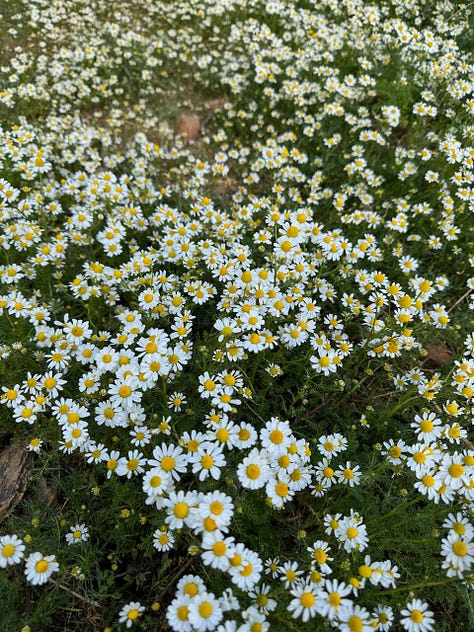


Judith had been there for a week and I was sad to see her go. It would be another week before Quinn showed up. As ever, this week, too, flew by. Parts of it were heavy: a villager had died a few days earlier. His funeral was sad, but simultaneously I felt how nice it was to live somewhere where the whole community shows up to say goodbye (in the church); have a coffee or tsipouro (outside the church); and then a lunch of fish soup together (at the deceased’s house, prepared by friends of the family).

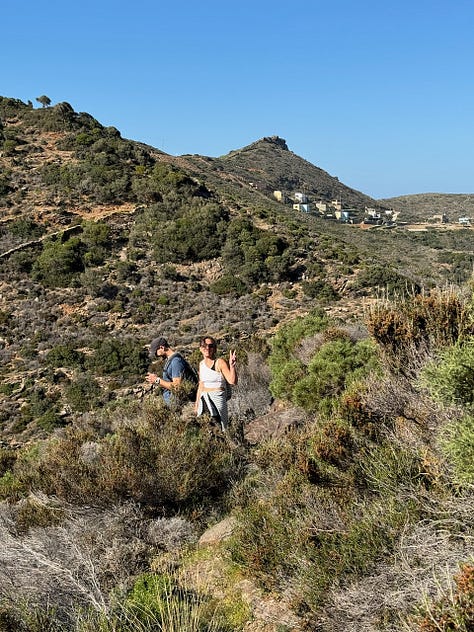
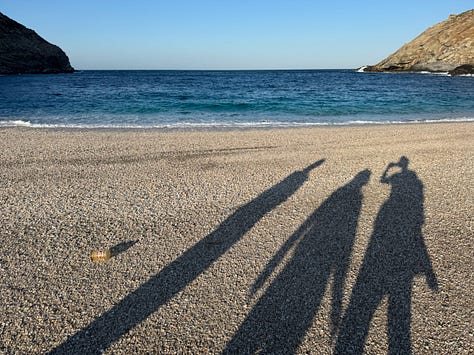
Other parts of the week were unambiguously lovely. I went on another hike, this time with new friends Jelena (who I had met hiking earlier) and Dimitris (who runs a hotel in Batsi and has an uncle who is a big hiking buff). Through his uncle, Dimitris knew of an unmarked path from the bottom of the #14 down to Zorgos Beach along the side of the mountain and then along the river bed. We saw eels, small sea turtles, and of course the obligatory sheep and goats, all with tiny babies. Eventually we reached the bottom of the Aegea Blue, then the beach. Spectacular, as ever.
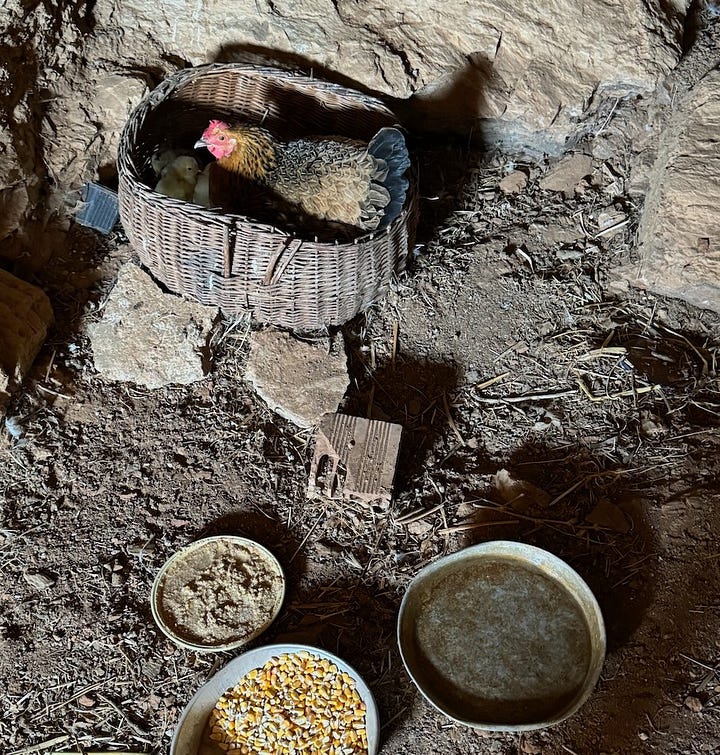
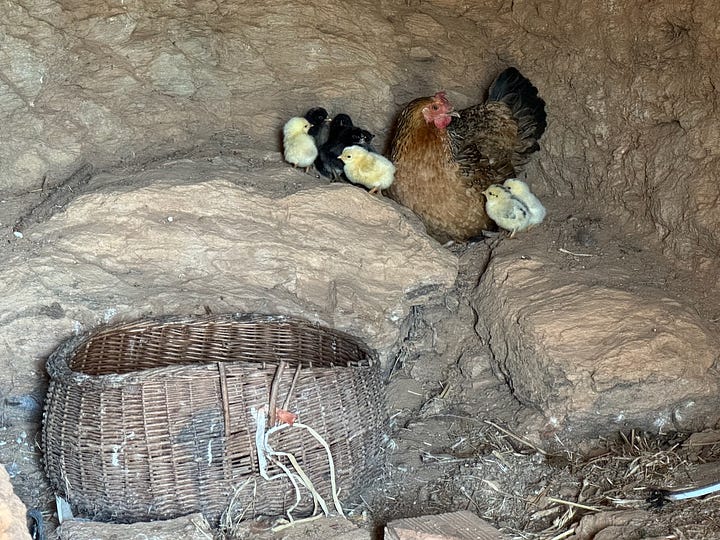

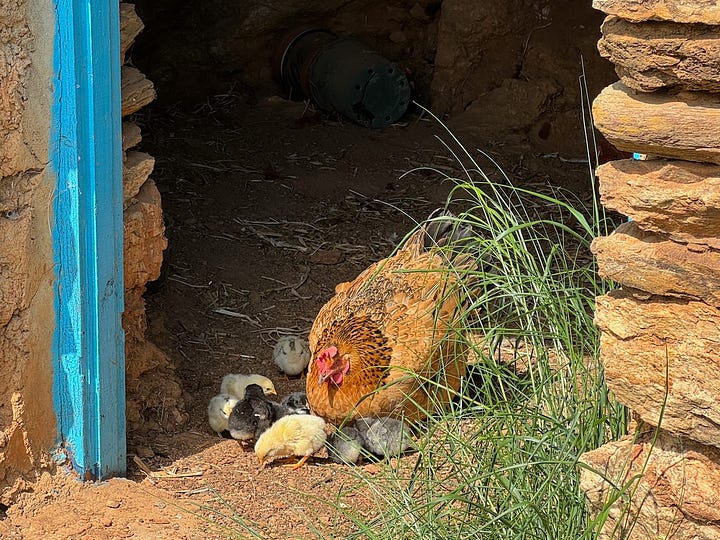
Also this week, many smaller things happened: I harvested a ton of chamomile, pruned and mulched a bunch more fruit trees, and learned from Maria how to make fig spoon sweets (siko glika / σύκο γλυκά) — more on this separately. The other big thing that happened: April 8, new life! After 21 days of keeping her head down, the hen sat back up as 9 of the 12 eggs hatched. Nine tiny kotopoulakia/κοτοπουλάκια, some yellow, some black, one gray, some yellow with hints of gray feathers, appeared. I had bought a giant sack of chick feed, which again elicited head-shaking from Ioannis. But he was also excited as he went to check the basket. Mother hen is very protective; she has a fit anytime you get too close. Nevertheless, I was worried about just letting them roam around free. The cats were many and, in the afternoon, hungry. So I took another trip to the hardware store to buy some stakes and chicken wire and built a little enclosure. Out they went, mother hen with a “peep-peep-peep”-ing cloud of kotopoulakia around her, all following her pecking lead. A few days later, I let them out after all, and so far the cats respect them. Hard to argue with their tiny cuteness.





Sounds like rural life in a nutshell. Glad your spirits are still high and that you have knowledgeable, hardworking friends! You definitely checked a lot of boxes. Well done, Judith.